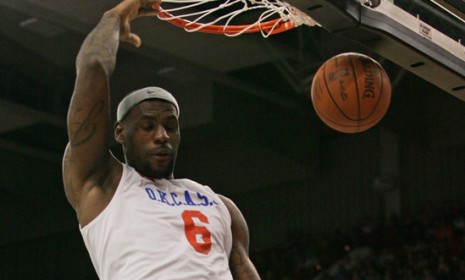The NBA lockout ends: Winners and losers
Basketball will be back on Christmas Day, thanks to a new labor deal between the league's owners and players. Who benefits the most?

A free daily email with the biggest news stories of the day – and the best features from TheWeek.com
You are now subscribed
Your newsletter sign-up was successful
A Christmas miracle? Despite predictions that labor unrest would force the NBA to cancel several months of games, the 2011-12 basketball season has been saved. After a 149-day lockout that cost players and owners hundreds of millions in lost revenue, the two sides emerged from a secret 15-hour bargaining session this weekend to announce that a shortened 66-game NBA season will begin on Christmas Day. The new labor deal essentially gives the owners and players a 50-50 split of league revenue, while also placing tougher luxury taxes on teams with high payrolls, and mandating that players be signed to shorter contracts. Who wins and loses with this new deal? Here, a brief guide:
WINNERS
Fans
The Week
Escape your echo chamber. Get the facts behind the news, plus analysis from multiple perspectives.

Sign up for The Week's Free Newsletters
From our morning news briefing to a weekly Good News Newsletter, get the best of The Week delivered directly to your inbox.
From our morning news briefing to a weekly Good News Newsletter, get the best of The Week delivered directly to your inbox.
"Regular folks who look to pro basketball for entertainment... distraction, or inspiration will be back in business," says Steve Aschburner at NBA.com. These are the people who did not benefit one iota from the lockout, and can only breathe a sigh of relief now that it's over. Better yet, says Donald Wood at Bleacher Report, the shortened season — 66 games instead of the normal 82 — is sure to be "wild" and unpredictable.
David Stern
The NBA commissioner made out like a bandit, says Mitch Lawrence at the New York Daily News. He got the owners the lucrative revenue split they wanted — under the old deal, players got 57 percent — along with harder salary caps. To many observers, Stern comes off like a hero who saved the day, and "best of all, he doesn't lose an entire season, which would have killed his legacy."
Owners
A free daily email with the biggest news stories of the day – and the best features from TheWeek.com
The owners stand to make as much as an additional $2 billion over 10 years thanks to the new deal, says Ben Golliver at CBS Sports. And really, they got major concessions on nearly every important issue in the new agreement: More revenue, shorter contracts, and a tougher luxury tax system — which is meant to help even the playing field between big- and small-market teams.
The best players
Shorter contracts will actually help some players, says Aschburner. Stars who "continue to produce, stay healthy, lead, [and] create wins" will be on the market sooner and more often. That means more opportunities to "cash in."
LOSERS
All the other players
"There's no sense in sugar coating it," says Adam Laurdisen at the San Jose Mercury News. The new revenue split is a huge loss in raw dollars for the players. Furthermore, this new agreement proves that the players' last negotiation tactic — dissolving their union and filing an antitrust suit against the league — was essentially fruitless, as the final deal still benefits the owners. Sure, things could've been worse. But "any time you leave a negotiation thinking" that, says Golliver, "you lost that negotiation."
Star-studded teams
Teams with massive payrolls and rosters full of expensive stars will now have to pay even more in luxury taxes. Franchises like the Miami Heat, which has three major stars in LeBron James, Dwyane Wade, and Chris Bosh, will now be tasked with convincing "two of those big three to take less money than they can get somewhere else," says Colin Stephenson at New Jersey's Star-Ledger. Some superstars might prefer to split town than take a pay cut.
Free agents
The higher luxury tax will hurt players who are free agents this season, says Wood, as many big-market teams who are suddenly paying millions more in luxury taxes may not be willing to fork over as much in salary money as they would have in the past.
-
 Local elections 2026: where are they and who is expected to win?
Local elections 2026: where are they and who is expected to win?The Explainer Labour is braced for heavy losses and U-turn on postponing some council elections hasn’t helped the party’s prospects
-
 6 of the world’s most accessible destinations
6 of the world’s most accessible destinationsThe Week Recommends Experience all of Berlin, Singapore and Sydney
-
 How the FCC’s ‘equal time’ rule works
How the FCC’s ‘equal time’ rule worksIn the Spotlight The law is at the heart of the Colbert-CBS conflict